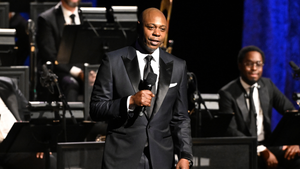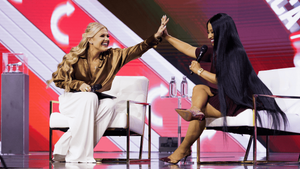American Idol viewers will never see this
particular performance of anti-AIDS songs and dances in a
modest community hall, but they helped pay for it.
After a
star-studded American Idol extravaganza in
April raised more than $75 million, the money is
trickling down to charities in the United States and Africa.
Five charities working in Africa each received $6
million, including an anti-AIDS peer education program
where students fuse ''What a Wonderful World'' with
African opera and break dancing with traditional rhythms.
''In the cemetery
there's young people. The youth are dying,'' said Mzamo
Ngemntu, a 23-year-old peer educator in Khayelitsha, an
impoverished district of a million people in Cape
Town, South Africa. He said the project is all that
stopped him from joining his many friends either in
jail or in a grave.
The campaign,
called Idol Gives Back, is the latest in a long line of
high-profile efforts to raise funds for Africa by
celebrities such as Bono, Bob Geldof, Madonna,
Angelina Jolie, and Brad Pitt. This celebrity charity
tends to help both the celebrity and the charity; the show
was touted as American Idol's biggest, drawing
70 million votes in a single night.
The benefit to
charity is small in the face of Africa's deep-seated
problems, but it helps. In the case of malaria, it means
seven bed nets per average donor.
''It makes a
massive difference. Massive,'' said Martin Edlund of the
charity Malaria No More. ''A little money goes such a long
way.''
Idol Gives Back
beneficiaries Malaria No More and Nothing But Nets say it
costs about $10 to buy and distribute one
insecticide-treated net and teach communities to use
it. Sub-Saharan Africa needs about 300 million nets.
Both Nothing But
Nets and Malaria No More also work with anti-measles,
AIDS, and tuberculosis initiatives, drawing on networks of
tens of thousands of community workers who reach
far-flung areas. It's a smart, cheap approach with
little scope for corruption.
''We have a
saying that you can't put a bed net in a Swiss bank
account,'' Edlund said. ''Only populations who need them are
getting them.''
The charities say
Idol Gives Back will also have a longer-term impact --
it showed a global audience of 60 million hard-hitting
images of the mosquito-borne disease that is still
Africa's leading child killer, claiming one young life
every 30 seconds. It's a chance to teach people that
malaria is an ongoing problem with a very tangible solution.
American Idol finalist Melinda Doolittle
visited Zambia in June with U.S. first lady Laura Bush and
Malaria No More. Doolittle's die-hard fans, called the
Backup Singers, used to throw her flowers. Now they
buy bed nets, according to Edlund.
The Charity
Projects Entertainment Fund -- linked to Britain's hugely
successful Comic Relief charity campaign -- also distributed
Idol Gives Back donations to Save the Children,
the U.N. Children's Fund and the Global Fund to Fight
AIDS, TB and Malaria, all well-established groups.
''With an
enterprise that's this high profile ... you have a kind of
duty in a way to start off doing work that people can
recognize and feel comfortable with,'' Kevin Cahill,
president of the Charity Projects Entertainment Fund
and chief executive officer of Comic Relief, said in
an interview in London.
In Rwanda, UNICEF
is using Idol Gives Back money to help heal wounds
from a genocide that killed 800,000 people. At Kawangire
Primary School, 60 miles east of Kigali, pupils have
formed clubs such as Unity and Reconciliation to
overcome ethnic tensions.
Even though
Rwanda has a record 93% primary enrollment, the school has a
high dropout rate because of poverty. It provides free meals
and catch-up programs to draw young dropouts back into
the classroom.
''I had dropped
out of school because my parents were very poor and I was
needed to do work on the sugar plantation because I am the
eldest,'' said 19-year-old Javier Ikitegetse. He is
now enrolled in the catch-up program in his final year
at Murama Primary school, and hopes to go to
university.
In Kenya about $1
million is going to Kibera, one of Africa's largest
slums, not far from Nairobi. The desperate story of Kibera
and two of its orphans, 12-year-old Grauman Omondi
Amadi and his 8-year-old sister Violet Akinyi Amadi,
was broadcast to millions of American Idol
viewers this year.
Reverend Anne
Owiti runs the Kibera Community Self Help Program, known as
Kicoshep, which operates a clinic, a youth training facility
and a school. Few Kibera residents have running water,
and disease is rampant.
''The money will
go a long way in helping the needy,'' Owiti said.
Back in Cape
Town, school headmaster Achmat Chothia said the performers
in the anti-AIDS program are no ''goody two-shoes.''
One performer,
Taahir Fisher, 17, said, ''Sometimes I might have a smile
on my face but my mum might be doing drugs at home. Always
remember there is a tomorrow. You might have problems
today, but the pain may go away tomorrow.''
Chothia said the
performers, with their hard-hitting plays about the
danger of drugs, sex and AIDS, are far more influential than
classroom teachers. About 400 people are involved in
the project, which offers a modest payment to trained
peer educators and operates in 140 vulnerable schools.
Local officials would like to expand to 300 schools but lack
the cash.
The Global Fund
singled out South Africa's Western Cape Province for Idol
Gives Back funding in part because of its strong youth
programs. HIV infection rates for those under 20 in
the province have decreased from 8.2 to 7.2 percent in
the past three years.
''If it was not
for the Global Fund we could not have done what we are
doing today,'' said Pierre Uys, the provincial health
minister. ''If you take that away, we are gone. It's
holding our health system together.''
Rajesh Anandan,
head of private sector partnerships at the fund, said
programs like ''Idol Gives Back'' show Americans and
Europeans that they are not giving handouts to charity
cases but helping capable people to get their lives
back.
''This isn't
about poor, starving, helpless, incompetent people,'' he
said.
He added that the
Idol Gives Back donation is not merely a drop in the
ocean.
''It's easy to
get lost in numbers of billions of dollars a year,'' he
said. ''But when you get down to funding things that work
and have a real impact, then $6 million goes a long
way.'' (Clare Nullis, AP)



































































Charlie Kirk DID say stoning gay people was the 'perfect law' — and these other heinous quotes